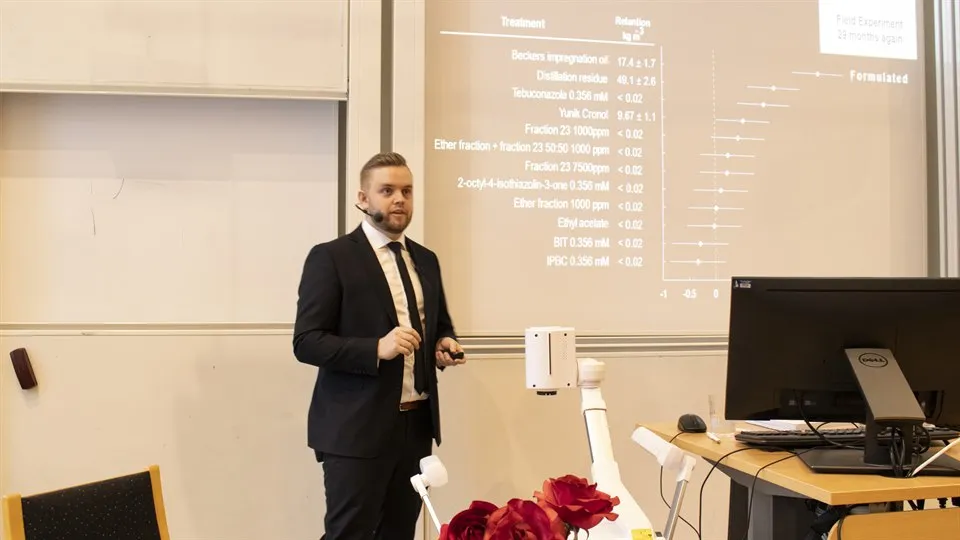Defence of the doctoral thesis in chemistry with Joel Ljunggren
On January 31th, 2020, Joel Ljunggren presented and defended his doctoral thesis in Chemistry at Mid Sweden University.
Title of the Thesis
Some Approaches to Developing Eco-Friendly Products from Natural Matrices
Abstract
Since the onset of the industrial and chemical revolution, humans have caused immense damages to our surrounding flora and fauna on a global scale. Effective methods for wood protection measures proved to be toxic; fossil fuels contribute to global warming and pesticides traces can be detected in air, water and soil. It has never been clearer that efforts to find non-toxic and eco-friendly products while simultaneously providing the necessary incentives for sustainable worldwide development are needed. Instead of relying on dead matter such as fossil fuels, renewable resources play a critical role in this shift towards circular economies.
Wood has a long history as a renewable resource in high demand, but its susceptibility to attack by wood-decaying fungi require most European wood to be protected for outdoor use. We showed that fractionating turpentine, a pulp and paper mill by-product, increased antifungal efficacy by concentrating bioactive oxygenated sesquiterpenes and diterpenes. Based on this result, recombinations of the fractions were shown to exhibit synergistic effects that enable a more efficient product utilisation. In addition, this approach enabled identifications of previously unknown Picea abies turpentine constituents present in low levels.
For a carbon-neutral society, production of biofuels using oleaginous yeast to convert lignocellulosic biomass has been hailed as a next-generation source of bioenergy. However, lignocellulose biofuel production by microorganisms is non-trivial and further challenged by the formation of microbe-toxic monomers, such as vanillin, during lignin degradation. The oleaginous yeast Cystobasidium laryngis and other potential oil-producing yeasts were screened for their viability and vanillin biotransformation capabilities. To this end, a mass chromatographic peak extraction tool called TMATE was developed. Contrary to the expected oxidative conversion into vanillic acid, vanillyl alcohol was found to be the main product.
The detrimental health and harmful ecological effect of pesticides attenuate the urgency for alternative crop protection measures such as biological insect control and semiochemicals. In this regard, we present an essential step towards understanding the varied chemical ecology of microbe-insect interactions. Our methodology and findings provide cues with high information value that can be used for well-informed and sustainable pest management regimes by, i.e. the push-pull methodology using live yeasts.
Supervisors
Professor Erik Hedenström
Professor Bengt-Gunnar Jonsson
Professor Dan Bylund
External Reviewer
Professor Olav Martin Kvalheim
Examining Committee
Professor emeritus Anna-Karin Borg Karlson
Professor Jan Stenlid
Doktor Björn Alriksson
Docent Kerstin Sunnerheim
